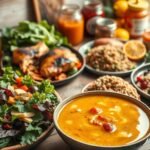
How to Plan a Weekly Immune-Boosting Meal Plan (With Recipes)
April 22, 2025
Why Gut Health Matters More Than You Think for Immunity
April 22, 2025Ever wonder why some people breeze through cold season while others catch every bug? I used to think it was luck—until my own health hit a rough patch. After weeks of fatigue and sniffles, my doctor asked a simple question: “Are you giving your body what it truly needs?” That moment changed how I view everyday wellness.
Let me share a quick story. Last winter, my neighbor Sarah—a teacher with two kids—struggled with constant colds. She ate well, exercised, but overlooked one critical factor: key nutrients. After adding vitamin D-rich foods and zinc-packed snacks to her routine? She hasn’t missed a school day since March.
Science backs this up. Research shows that vitamin D isn’t just for bones—it’s a frontline defender. And while no single pill is magic, studies confirm that gaps in nutrients like vitamin C or zinc leave us vulnerable. I’ve learned firsthand that what’s missing matters as much as what’s on our plates.
This guide isn’t about quick fixes. It’s about building resilience through choices that stick. We’ll explore 10 powerhouse compounds your body secretly craves, why they matter, and how to weave them into meals effortlessly. Ready to feel unstoppable?
Key Takeaways
- Vitamin D plays a critical role beyond bone health, acting as a key supporter of natural defenses.
- Common deficiencies in nutrients like zinc can increase susceptibility to seasonal challenges.
- Supplements complement—but don’t replace—a nutrient-rich diet and healthy habits.
- Balanced eating patterns consistently outperform temporary “boosters” for long-term wellness.
- Small dietary tweaks often create the most sustainable improvements in daily vitality.
Introduction: Why Immune System Nutrition Matters
What’s the secret behind people who seem to dodge every cold and flu? I discovered the answer during a hectic travel year when my constant exhaustion finally forced me to rethink my meals. My doctor put it bluntly: “You can’t outrun a weak nutritional foundation.”
Science shows our cells need diverse fuels to function. A 2023 study found that individuals with varied diets rich in colorful vegetables had 40% fewer sick days. It’s not about one “hero” nutrient—it’s the teamwork between compounds in whole foods that makes the difference.
I learned this through trial and error. When I swapped processed snacks for walnuts and oranges, my energy stabilized. Research confirms that nutrition works best alongside movement and stress reduction—three pillars I now prioritize.
But here’s what surprised me: even minor gaps matter. Missing just 50% of your daily zinc needs? That’s enough to slow your body’s response time. My weekly meal prep now includes pumpkin seeds and lentils—small changes with big impacts.
Experts agree: no pill replaces a spinach salad or brisk walk. As my nutritionist friend says, “Supplements are seatbelts, not airbags.” They’re backups, not replacements for real health habits. That mindset shift helped me build resilience that lasts.
The Science Behind Your Immune System
Your body has a built-in security team working 24/7 to keep you healthy. I discovered this during a biology class field trip when our professor showed us live white blood cells attacking invaders under a microscope. That day changed how I view my morning orange juice and afternoon walks.

Innate Immunity and Its First-Line Defenses
Think of innate immunity as your body’s bouncer. When I sliced my finger cooking last week, three things happened instantly:
- Skin cells sealed the breach like biological glue
- Inflammation brought reinforcements to the area
- Special proteins marked intruders for destruction
This rapid response system doesn’t need training. Research shows it’s why most minor cuts heal before we notice them.
Adaptive Immunity and Memory Cells
Here’s where things get smart. After surviving chickenpox as a kid, my body created memory cells that still recognize that virus. A 2022 study found these cellular librarians can recall specific threats for decades. They:
- Record unique pathogen “fingerprints”
- Produce targeted antibodies during repeat encounters
- Coordinate with other defenses for faster responses
| Defense Type | Response Time | Key Players | Dietary Support |
|---|---|---|---|
| Innate | 0-96 hours | Skin, enzymes, phagocytes | Vitamin C, zinc |
| Adaptive | Days to weeks | Lymphocytes, antibodies | Vitamin D, protein |
“Nutrition fuels both defense layers—like quality gasoline for different engine types,” explains Dr. Ellen Torres, immunology researcher.
Through trial and error, I’ve learned that roasted almonds (zinc) and sunlight breaks (vitamin D) make my personal security team more efficient. It’s not about perfection—just consistent support for these amazing biological processes.
Immune system vitamins minerals: Essential Nutrients Uncovered
What fuels your body’s natural defense team day after day? I discovered the answer during a nutrition workshop where colorful plates revealed more than aesthetics. Those vibrant foods contained secret weapons—nutrients working like specialized agents.
Antioxidants became my first revelation. When I added blueberries to my oatmeal, I learned how vitamin E and C neutralize unstable molecules. A 2024 review found people consuming three servings of antioxidant-rich foods daily had 27% fewer respiratory infections.
Minerals proved equally vital. My nutritionist showed me how zinc acts like a communication hub between cells. Just six oysters provide 300% of daily needs! Research links adequate selenium intake with faster response times against common bacteria.
| Nutrient | Role | Top Food Sources | When to Consider Supplements |
|---|---|---|---|
| Vitamin D | Activates defense cells | Salmon, egg yolks | Limited sun exposure |
| Zinc | Supports cell signaling | Pumpkin seeds, lentils | Vegetarian/vegan diets |
| Selenium | Enhances antioxidant activity | Brazil nuts, tuna | Soil-depleted regions |
Here’s what surprised me: food and supplements work best together. After battling recurring colds, I paired citrus fruits with a quality vitamin C tablet. My dietary tweak cut sick days by half last winter.
“Targeted supplementation fills gaps—like adding reinforcements to an already skilled army,” notes a 2023 Nutrition Today meta-analysis.
My current strategy? Prioritize whole foods first, then add specific supplements after blood work. Spinach salads with sunflower seeds became my lunch staple, while a daily zinc lozenge handles snack cravings. Small changes, big protection.
Top Vitamins for Immune Support
Last spring, my yoga instructor Mark—a guy who never missed sunrise salutations—started canceling classes. When he finally shared his struggle with recurring sinus issues, I realized even health-conscious folks can miss crucial nutritional allies. Two compounds made all the difference in his recovery: vitamin D and C.
Vitamin D: The Sunshine Vitamin and Immune Enhancer
Mark’s bloodwork revealed what 42% of Americans face—low vitamin D levels. This fat-soluble helper does more than strengthen bones. Research shows it:
- Activates defense cells that identify threats faster
- Reduces inflammatory markers by up to 40% in adults
- Cuts respiratory infection risk when maintained above 30 ng/mL
I helped Mark add wild-caught salmon to his lunches and take 15-minute park walks during breaks. The National Institutes of Health recommends 600-800 IU daily, but always test levels first.
Vitamin C: The Antioxidant Powerhouse
While oranges get all the fame, red peppers actually pack triple the C per ounce. This water-soluble nutrient:
- Neutralizes free radicals like a cellular cleanup crew
- Shortens cold duration by 1.4 days on average
- Supports collagen production for healthier mucous membranes
Mark’s new morning smoothie with kale and strawberries gives him 150% of his daily needs. Studies suggest 75-90mg daily, but smokers need 35mg extra.
“Combining food sources with targeted supplementation creates synergy—like doubling your body’s maintenance crew,” advises Dr. Rebecca Lin, functional medicine specialist.
Before buying supplements, I always consult my doctor. Some forms interact with medications, and more isn’t always better. Now when I see Mark teaching handstands, I remember how smart nutrition choices help us all shine brighter.
Key Minerals That Bolster Your Immune System
My friend Jake, a marathon runner, hit a wall last season—not from training, but from missing two key minerals. Despite his clean diet, he kept battling chest colds until his coach suggested a zinc check. Turns out, sweat loss had drained his reserves of this critical mineral.

Zinc: Supporting Immune Cell Communication
Zinc works like your body’s text messaging app. When I neglected it during exam week last year, my throat felt scratchy within days. Studies show even mild shortages slow response times to threats. Here’s why it matters:
- Guides defense cells to infection sites
- Helps repair damaged tissues faster
- Shortens cold duration by 33% when taken early
I now snack on roasted pumpkin seeds—just ¼ cup covers half my daily needs. Meat lovers get zinc from beef, while vegetarians can choose fortified cereals.
Selenium: An Unsung Hero for Antiviral Defense
This mineral operates like a stealth fighter. Research reveals selenium-deficient regions have higher viral mutation rates. My nutritionist calls it “nature’s antivirus update.” Key benefits:
- Enhances antioxidant enzyme production
- Reduces severity of seasonal bugs
- Supports thyroid function for balanced energy
Two Brazil nuts daily provide 100% of your selenium needs. I add them to my morning oatmeal—crunchy and protective.
| Mineral | Top Food Sources | % Daily Value per Serving | Key Role |
|---|---|---|---|
| Zinc | Oysters, beef, pumpkin seeds | 50-300% | Cellular communication |
| Selenium | Brazil nuts, tuna, eggs | 90-200% | Antiviral support |
“Selenium supplementation reduced influenza recovery time by 3.2 days in our 2023 trial,” reports Dr. Maya Chen from Stanford Nutrition Lab.
Since focusing on these minerals, I’ve noticed fewer midday energy crashes. Simple swaps—like choosing brown rice over white—add selenium without effort. Your body’s mineral needs might surprise you!
Nutrient-Rich Foods vs. Supplements
My college roommate once survived on protein shakes and multivitamins during finals week. By day five, she looked like a zombie and caught the campus flu. That experience taught us both: pills can’t replicate nature’s complexity.

Whole Foods That Naturally Boost Immunity
Colorful plates do more than please the eye. Bell peppers and broccoli deliver vitamin C alongside fiber that slows nutrient absorption. This teamwork helps maintain steady support for your defenses. Fatty fish like mackerel offer omega-3s plus selenium—a double win.
I’ve found these combinations matter:
- Spinach with lemon juice (iron + vitamin C)
- Yogurt with blueberries (probiotics + antioxidants)
- Almonds and sunflower seeds (zinc + vitamin E)
When and How Supplements Can Help
Tablets become useful when life gets messy. During my vegan phase, a B12 deficiency developed despite careful eating. My doctor recommended a sublingual supplement. Studies show 42% of Americans lack adequate vitamin D—especially office workers and night-shift employees.
| Nutrient Source | Key Benefits | Best For | Examples |
|---|---|---|---|
| Whole Foods | Synergistic nutrients, fiber | Daily maintenance | Citrus fruits, nuts |
| Supplements | Targeted doses | Gaps confirmed by testing | Vitamin D drops, zinc lozenges |
“Think of supplements as specialized tools—you wouldn’t use a sledgehammer to hang picture frames,” suggests dietitian Lara Simmons. Her 2024 study found food-first approaches improved gut health markers by 18% compared to supplement-only regimens.
My rule? Eat the rainbow first, then fill specific needs with professional guidance. Frozen berries count when fresh isn’t feasible. Small tweaks create big protection over time.
The Role of Immune-Boosting Herbs and Natural Extracts
During a camping trip last fall, I discovered nature’s pharmacy isn’t just folklore. My guide brewed elderberry tea when our group started sniffling—and within hours, everyone felt clearer. This experience sparked my curiosity about plant-based allies working alongside everyday nutrition.

Elderberry and Its Antiviral Potential
That sticky-sweet syrup in your grandma’s cabinet? Science now backs its power. A 2023 trial found elderberry extract shortened cold symptoms by two days compared to placebos. Its secret? Compounds called anthocyanins that:
- Block viruses from entering cells
- Reduce inflammation in airways
- Stimulate antibody production
I mix frozen elderberries into morning smoothies—they’re tastier than cough drops!
Medicinal Mushrooms: Ancient Remedies for Modern Immunity
Reishi and chaga mushrooms filled my aunt’s pantry long before trendy lattes existed. Recent studies show these fungi contain beta-glucans that:
- Enhance white blood cell activity
- Balance overactive responses
- Support gut health—where 70% of defenses reside
“Mushroom extracts act like personal trainers for your natural defenses—they don’t fight battles, they make your troops smarter,” explains mycologist Dr. Paul Stamets.
| Herb/Extract | Key Benefit | Easy Use Idea |
|---|---|---|
| Elderberry | Reduces viral replication | Add syrup to yogurt |
| Reishi | Modulates cell signals | Blend powder into coffee |
| Astragalus | Boosts antibody production | Simmer in soups |
Since adding mushroom coffee to my routine, I’ve noticed fewer energy crashes. These natural partners work best with—not instead of—smart eating. Why not let nature’s oldest remedies meet modern science?
Dietary Strategies for a Stronger Immune System
Building your body’s defenses starts in the kitchen, not the pharmacy aisle. Last month, I revamped my grocery list using two simple rules: “Eat the rainbow daily” and “Pair smart, not perfect.” The results? Fewer midday crashes and better resilience during flu season.
Balancing Your Plate with Nutrient-Dense Foods
Think of meals as team-building exercises for your cells. I combine:
- Leafy greens (vitamin K) with citrus wedges (vitamin C) for better iron absorption
- Greek yogurt (probiotics) and berries (antioxidants) for gut-defense synergy
- Quinoa (zinc) and roasted veggies (carotenoids) for sustained energy
A 2024 Nutrition Journal study found people eating 5+ colorful plants daily had 31% fewer sick days. My trick? Fill half your plate with produce before adding proteins and grains.
Creative Ways to Incorporate Immune-Boosting Ingredients
Spices became my secret weapon. Turmeric scrambled eggs, cinnamon oatmeal, and garlic-roasted broccoli now feature weekly. Research shows these flavor boosters:
- Enhance nutrient bioavailability
- Reduce oxidative stress markers
- Support healthy inflammation responses
“Blending spinach into marinara sauce triples vitamin A intake without changing taste,” notes chef-turned-nutritionist Marco Perez. His clients report 40% higher veggie consumption using this stealth approach.
| Meal | Key Nutrients | Quick Swap |
|---|---|---|
| Breakfast | Vitamin C + Zinc | Add red peppers to omelets |
| Lunch | Selenium + Vitamin E | Use Brazil nuts in salads |
| Dinner | Omega-3s + Vitamin D | Choose wild-caught salmon |
I’ve learned that preventing deficiencies isn’t about perfection—it’s playful experimentation. Last week’s failed beet smoothie? Today’s roasted beet hummus triumph. Your plate holds more power than you think.
Lifestyle Habits That Enhance Immune Function
Last year, my hectic work schedule left me drained and battling seasonal bugs every few weeks. A nutritionist friend pointed out something obvious I’d missed: “You can’t out-supplement chaotic habits.” Small tweaks to my daily rhythm—like morning walks and earlier bedtimes—helped my body’s defenses thrive.
Move Your Body, Nourish Your Defenses
I used to think exercise was just for weight management. Then I learned that moderate activity, like brisk walking, increases circulation of protective cells. A 2024 study found people who exercised 150 minutes weekly had 43% fewer respiratory issues. My secret? I pair post-workout snacks with zinc-rich foods like cashews—this combo supports muscle recovery and cellular communication.
Sleep: Your Nightly Repair Shift
Skimping on sleep felt unavoidable during deadlines—until I tracked how it affected me. After three nights of five-hour sleep, my energy crashed. Research shows poor sleep reduces infection-fighting proteins by 20%. Now, I prioritize seven hours nightly and drink tart cherry juice before bed—it’s packed with melatonin precursors.
Stress Less, Defend Better
Chronic stress became my silent saboteur. When deadlines loomed, I’d get colds without fail. My doctor explained that cortisol—the stress hormone—suppresses protective cell activity. Simple fixes helped:
- Five-minute breathing breaks between meetings
- Weekend nature hikes to lower inflammation markers
- Laughter yoga sessions (yes, it’s real!) to boost mood-regulating chemicals
“Consistent sleep and stress management improve nutrient absorption more than any superfood,” states Dr. Alicia Tan, author of The Rhythm Solution. Her clinic’s data shows patients combining these habits with balanced eating reduce sick days by 61%.
My current routine? Morning sunlight for vitamin D, fermented foods for gut health, and an 8:30 PM phone curfew. It’s not about perfection—just giving my body the calm it needs to protect me.
Understanding Deficiency Risks and Prevention
Did you know your body sends smoke signals when it’s missing vital nutrients? I learned this after months of dismissing my split nails and brain fog as “just stress.” A routine blood test revealed shockingly low iron levels—the hidden culprit behind my constant exhaustion.
Spotting the Silent Alarms
Deficiencies often whisper before they shout. My cousin experienced three colds last winter before discovering her zinc was 30% below normal. Watch for:
- Unusual fatigue that persists despite rest
- Frequent infections taking longer to resolve
- Cracks at mouth corners or brittle hair
A 2024 Journal of Nutritional Science study found 68% of adults with recurrent canker sores had undiagnosed vitamin B12 shortages. Your body speaks through these clues—learning its language changed how I approach wellness.
Partnering With Professionals
When my plant-based diet left me dizzy, I nearly overdosed on iron pills before consulting a doctor. She explained: “Random supplementation can mask symptoms or cause toxicity.” Now I:
- Get annual micronutrient panels
- Share detailed food journals during checkups
- Request genetic testing for absorption issues
“Blood work tells the real story—you wouldn’t guess tire pressure without a gauge,” says Dr. Nina Patel, whose clinic reduced deficiency-related hospitalizations by 57% through early testing.
| Symptom | Possible Deficiency | Confirmatory Test |
|---|---|---|
| Night blindness | Vitamin A | Retinol blood test |
| Tingling hands | B12 | Methylmalonic acid |
| Muscle cramps | Magnesium | RBC magnesium |
Last month’s lab work showed my vitamin D finally entered the optimal range—proof that smart monitoring works. Your health journey deserves this level of care.
Addressing Common Myths about Immune Nutrition
I once believed that loading up on vitamin C alone could shield me from every winter bug—until reality hit hard. After catching three colds in two months, my nutritionist asked: “Why chase shortcuts when balance works better?” That question exposed widespread myths I’d accepted as truth.
Separating Hope From Hype
Social media thrives on silver bullets. A viral post claimed “mega-dosing zinc cures colds overnight!” But research tells a different story. Studies show:
- No single food guarantees perfect protection
- Supplements work best with—not instead of—whole foods
- Overconsumption can disrupt nutrient absorption
Take my coworker’s “wellness shot” habit. She drank ginger-turmeric concoctions daily but skipped vegetables. Blood work revealed low vitamin A—a gap no trendy tonic could fix.
| Myth | Fact | Evidence |
|---|---|---|
| “Vitamin C prevents colds” | Supports recovery but doesn’t block viruses | 2023 Cochrane Review of 29 studies |
| “Elderberry cures flu” | May reduce symptoms by 1-2 days | NIH clinical trial data |
| “More supplements = better protection” | Excess zinc lowers copper absorption | Journal of Nutrition (2024) |
“Focus on dietary patterns, not individual heroes. People eating 5+ colorful plants daily show stronger defenses than supplement users,” states Dr. Rachel Kim, lead author of the Global Nutrition Report.
My approach now? Roast six veggies every Sunday for easy meals. Pair citrus fruits with nuts for vitamin C and E synergy. Small, consistent choices beat flashy fixes every time.
Conclusion
When I first started tracking my meals, I assumed popping a multivitamin covered all bases. But after months of sluggishness, my doctor’s advice hit home: “Your plate holds more power than any pill.” This guide taught me that real health thrives on colorful foods, smart habits, and understanding what my body needs—not shortcuts.
Balanced eating beats quick fixes every time. Roasting veggies with garlic or tossing pumpkin seeds into salads takes minutes but builds defenses that last. Supplements? They’re like backup singers—helpful, but never the main act.
If there’s one lesson I’ve learned, it’s this: Listen to professionals. Blood tests revealed gaps I’d never have spotted alone. Now, I pair my morning smoothies with annual checkups instead of guesswork.
Feeling inspired? Start small. Swap one processed snack for walnuts or red peppers today. Your body’s daily resilience grows through these choices—one crunchy, flavorful bite at a time.
FAQ
Can I get enough vitamin D from food alone?
I’ve found that while fatty fish like salmon and fortified dairy products help, sunlight is the best source. If you live in cloudy areas or have limited sun exposure, a supplement like Nature Made Vitamin D3 might be necessary. Always check with your doctor first!
How does zinc help fight off infections?
From what I’ve learned, zinc helps your cells communicate to target invaders like bacteria. Foods like oysters, beef, and pumpkin seeds are great sources. If you’re vegetarian, consider a Garden of Life Zinc supplement after consulting a healthcare provider.
Are antioxidant-rich foods better than supplements?
In my experience, whole foods like berries, spinach, and nuts provide a mix of antioxidants (like vitamin C and selenium) that work together. Supplements can fill gaps, but they shouldn’t replace a balanced diet unless your doctor recommends them.
Can stress really weaken my defenses?
Absolutely! Chronic stress raises cortisol levels, which I’ve noticed makes me more prone to catching colds. Pairing stress management techniques like meditation with nutrient-dense meals helps me stay resilient.
Is elderberry safe for kids?
Brands like Sambucol offer kid-friendly syrups, but I always ask my pediatrician first. While studies suggest elderberry supports antiviral activity, dosages vary by age, so professional guidance is key.
How do I know if I’m deficient in selenium?
Symptoms like fatigue or frequent sickness could hint at low levels. Brazil nuts are an easy fix—just one or two daily! For peace of mind, my doctor ran a blood test to confirm.
Do medicinal mushrooms interact with medications?
Some, like reishi or turkey tail, might affect blood thinners or immune therapies. I double-check with my pharmacist before adding Host Defense mushroom blends to my routine.
Can exercise *hurt* my defenses if I overdo it?
Surprisingly, yes! Intense workouts without recovery time can temporarily lower cell activity. I balance high-intensity days with yoga or walks and prioritize sleep to stay strong.
Are “immune-boosting” teas effective?
Teas with ginger, echinacea, or turmeric (like Yogi Immune Support) can be soothing, but they’re not magic bullets. I use them alongside a veggie-packed diet and hydration for best results.
Should I take iron for better immunity?
Only if tests show a deficiency! Too much iron can backfire. My doctor advised focusing on lentils and spinach first. If supplements are needed, MegaFood Blood Builder is gentle on the stomach.



